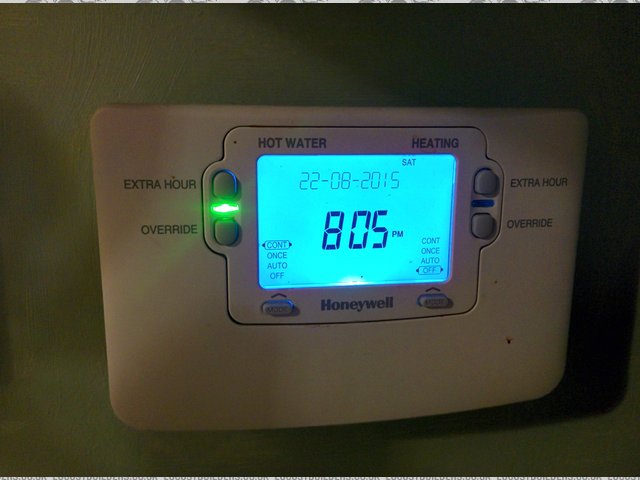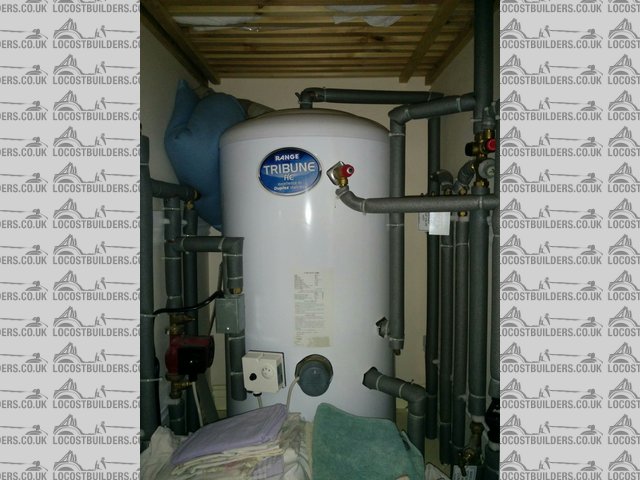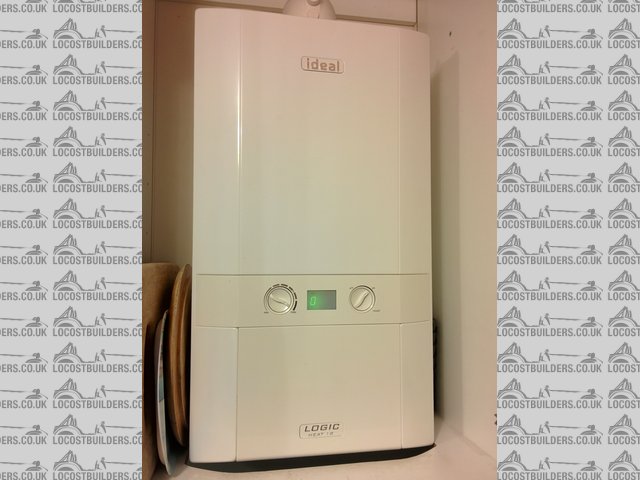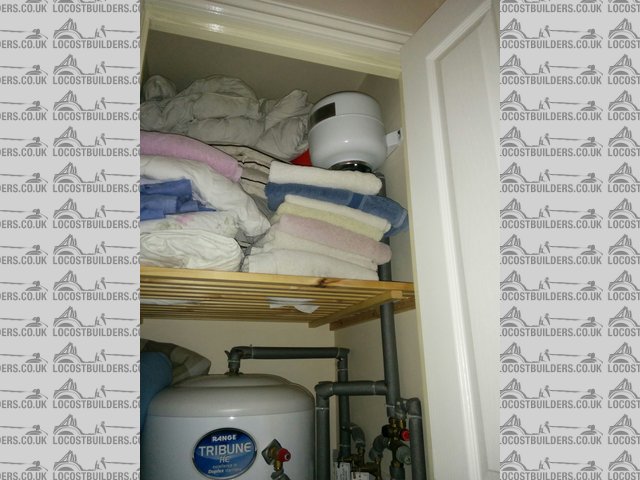
ID my central heating system please
locoboy - 22/8/15 at 07:49 PM
Ok I currently live in a 2 yr old 3 story town house on a new build estate and this is my hot water set up.
Ideal Logic Heat 18 boiler
Tank in the upstairs airing cupboard
Wall thermostat downstairs
Digital controller beside the boiler.
We only rent this place and we are looking at houses to buy at the moment and I don't want to lumbar myself with an expensive to run out dated
and inflexible hot water system in anything I buy.
This system works for us at the moment and provides us with hot water any time of day or night.
I have looked at a house today and they have a 3 week old boiler on the wall and it was an ‘IDEAL’ boiler.
They also had a tank in the airing cupboard.
I wasn’t looking at whether is had an electrical supply to the tank, or if it had a wall mounted thermostat the same as I currently have (that’s what
second viewings are for!)
I remember heating systems from my youth (1980s) where you could only have hot water between certain times of the day because the water was ‘on’
I was under the impression that if you had a tank in the airing cupboard then that is how it would be, either that or it would cost a fortune to keep
it ‘on’ all the time.
My old house had just one single stand alone boiler with no tank etc but I notice it took much longer to get the hot water to the tap than it does in
this house with this current set up.
Can anyone explain how this set up in the photos below works in respect of hot water out the tap and heating your radiators?
Cheers


Hot water 1


hot water 2


Hot water 3


hot water 4
[Edited on 22/8/15 by locoboy]
[Edited on 22/8/15 by locoboy]
coozer - 22/8/15 at 07:59 PM
I junked the back boiler and tank back in the 90's.. Installed a combi and wouldn't look back..
Reminds me of the 'good old days'.. Coal fire with a back boiler.. fire roaring up the chimney with the pipes up the wall banging away and
the overflow from the tank spitting steam! Then off to bed to freeze our nuts off...
Current condensing combi's are a no brainer.....
Beats me way new builds don't have the best technology put in from the start.. (Cost obviously for a tight arse builder)
locoboy - 22/8/15 at 08:00 PM
ours is currently set on continuos for hot water, is that the same as the old systems from my youth being 'on' all the time, If I were to
set mine to a timed setting would I find I did not have hot water outside of those times?
If this is the case then what is the advantage of this system over a single boiler and no tank installation, and vice versa?
Sorry for all the stoopid questions!
Col
Wadders - 22/8/15 at 08:03 PM
Indirect unvented cylinder in the pics.
coozer - 22/8/15 at 08:08 PM
Yep, looks like the same setup. Boiler keeps the cylinder hot whether you use it or not. Boiler monitors the temp of the 100 or so litres and
maintains it at the set temp.
My combi fires up and heats the water as we need it.
I realy don't see what advantage a boiler and cylinder setup has in a home..
When I move if the new house has that kind of setup it will be ripped out and Help link called in for a new combi!
mark chandler - 22/8/15 at 08:12 PM
With electric Emersion heater, why are they putting these old systems in these days?
I have junked all the old rubbish, AAA rated combi boiler, used one larger than the house needs so I can pull hot water at mains pressure and have
never looked back.
Wadders - 22/8/15 at 08:18 PM
Modern combis are pretty good, however there are advantages to having stored DHW especially in larger multi bathroom properties.
Unvented cylinders are the most efficient form of stored DHW, especially twin coil versions coupled to solar.
You also get the advantage of a less complicated boiler with less to go wrong than a combi they tend to last longer.
ianhurley20 - 22/8/15 at 08:41 PM
I have a hot water tank fed with a solar panel on the roof, don't need a combi boiler
britishtrident - 22/8/15 at 08:52 PM
There will be a wall mount thermostat in a public room and a thermostat on the hot water tank.
The water tank will in addition have a boosters/back-up electrical imersion heater, usually a controlled by manual or auto off boost switch in the
kictchen. The electrical immersion heater will not normally be used unless the heating is completely turned off or need a lot of hot water.
The programmer near the boiler will be conneted to a Honeywell 3 way valve , will allow you to set on off timers separately for the heating and there
will be thermostat on the boiler sets the hot water temperature.
The Ideal Logic 18 is a fairly big boiler condensing boiler 90% efficiency which is pretty good. The left hand knob on the boiler controls the boilers
thermostat, normally turned down in summer, in winter turned beyond the 11 o'clock position the boiler works as a condensing boiler.
britishtrident - 22/8/15 at 09:01 PM
quote:
Originally posted by mark chandler
With electric Emersion heater, why are they putting these old systems in these days?
I have junked all the old rubbish, AAA rated combi boiler, used one larger than the house needs so I can pull hot water at mains pressure and have
never looked back.
The electric heater is a back-up also some people turn their heating completely off in the summer.
A well insulated water tank will keep the water hot for very long time.
cliftyhanger - 22/8/15 at 10:30 PM
To be fair, the most efficient boiler are not hugely cheaper to run than old inefficient boilers. Don't get too hung up on the cost savings of
85% v 90%, in the real world the difference is way less than the 5% it would seem.
What it comes down to is 3 systems, a "normal" tank that provides hot water via gravity, tank in the roof etc. Pressurised tank (what you
have) or combi which heats water on demand.
Combi systems liked by many as no cylinders and simplified plumbing. Pressurised tanks and systems can be terribly installed and complicated.
Conventional systems are just that, work and simple though extra bits and bobs over a combi.
We have had combi's fitted. Tend to be reliable and I put that down to fit and leave alone. We have them in rentals, and apart from an issue with
one where it was interfered with by "unkwon persons" who overpressurised it and it needed a new PRV (worcester so difficult access =£200,
most boilers a £10 part and 10 mins) we have had 3 breakdowns in about 35 years total boiler lives. (3 boilers in different properties) so not exactly
unreliable. Saying that I would only have Vaillant fitted.......Std boiler 1 fan in 12 years. so broadly same reliability.
Sorry, got carried away!
britishtrident - 23/8/15 at 06:38 AM
A condensing boiler cuts the heat lost by the boiler by half but ---
1990s non-condensing boilers are just on 80 percent efficient, a decent condensing boiler is at most 90 percent efficient.
If the gas bill is £70 per month then the 1990s conventional style boiler throws away £14.00 with the exhaust gas and the condensing boiler only
£7.00.
Grants and cash back schemes where they exist only generally pay out for much older boiler types that are pretty ancient and have lower
efficiency.
Cost of replacing with condensing boiler like for like for a £7.00 saving pcm is £1100 to £1700 so it will take 11 to 20 years for changing to a
condensing boiler to pay off on bill reduction grounds.
A lot more money can be saved by using modern programmable central heating room thermostats and setting them properly.
The hot water storage tank temperature should be 55 to 65c below 50c introduces the risk of Legionella but temperatures that are too high introduce
the risk of scalding and increase energy consumption. If you have old people or young children in the house the temperature should be about 50c at the
tap.
[Edited on 23/8/15 by britishtrident]
JC - 23/8/15 at 06:51 AM
We have a 1990s Worcester Bosch oil boiler and a hot water tank. Every year when it is serviced, the guy that does waxes lyrical about how much
better the old boilers are - says he replaces 'no end' of more modern combI boilers as they just aren't the same quality!
I looked up the efficiency of our boiler and as previously mentioned, there was only a per cent or 2 difference - it would take a long time to save
the cost of a replacement!!! There was a website where you could look up the efficiency of particular boilers but I can't find it at the mo.
JC - 23/8/15 at 06:56 AM
Found
it
For some reason the site crashed whenever I tried to insert this into my previous post!
David Jenkins - 23/8/15 at 08:42 AM
We have a combi boiler and I wouldn't have anything else (entirely my own opinion, of course!). No external tanks, and hot water on demand. The
are much more complex, and there are quite a few things to go wrong if you are unlucky.
However, you do have to get a good make - we had a Baxi for many years, and we must have called out the service engineers about 5 or 6 times a year
(fortunately we had a service contract - Baxi's Heat Team must have lost a mint on us!). In the end we changed it to a Vaillant and, in the past
18 months, we've had 1 service call-out - this was for a diversion valve that the technician thought was probably faulty from new ('bathtub
curve failure', if you've every come across that expression). Vaillant had a special offer on, so we got 7 years warranty when we bought
the boiler, so that didn't cost us anything.
Both Vaillant and Worcester Bosch always seem to come up in conversations about good reliability...
[Edited on 23/8/15 by David Jenkins]
cliftyhanger - 23/8/15 at 09:39 AM
quote:
Originally posted by britishtrident
A condensing boiler cuts the heat lost by the boiler by half but ---
1990s non-condensing boilers are just on 80 percent efficient, a decent condensing boiler is at most 90 percent efficient.
If the gas bill is £70 per month then the 1990s conventional style boiler throws away £14.00 with the exhaust gas and the condensing boiler only
£7.00.
Grants and cash back schemes where they exist only generally pay out for much older boiler types that are pretty ancient and have lower
efficiency.
Cost of replacing with condensing boiler like for like for a £7.00 saving pcm is £1100 to £1700 so it will take 11 to 20 years for changing to a
condensing boiler to pay off on bill reduction grounds.
A lot more money can be saved by using modern programmable central heating room thermostats and setting them properly.
The hot water storage tank temperature should be 55 to 65c below 50c introduces the risk of Legionella but temperatures that are too high introduce
the risk of scalding and increase energy consumption. If you have old people or young children in the house the temperature should be about 50c at the
tap.
[Edited on 23/8/15 by britishtrident]
However, that efficiency rating is only under optimal conditions. How much of the time is that the case?? rare I suspect (not checked how they define
optimal, but I bet it isn't as simple as it seems)
Locally a straight combi swap is 2-2.5k. A decent combi to buy is 900-1200 depending on size. How they get away with the fitting cost is beyond me.
SteveWalker - 23/8/15 at 02:40 PM
Personally I prefer having a hot-water tank. At least if anything goes wrong (boiler, pump, valves, thermostats, timers), you can use an immersion
heater to ensure that you have hot water for showering until you can get it all sorted out. With a combi, a single failure can take out everything and
it could take days or even weeks to get parts.
At one point we suffered a boiler failure (exhaust fan motor) mid winter. Not only did we still have hot water, but by frigging the system, we could
actually circulate the water and use the immersion heater as a low powered central heating boiler - at least taking some of the chill off the main
rooms!
Toltec - 23/8/15 at 04:11 PM
There is also the option of a storage combi boiler.
locoboy - 25/8/15 at 12:19 PM
Thanks for your input fellas, much appreciated.
Iv'e put an offer on the property this morning so we will wait and see............
Cheers
Col
ravingfool - 25/8/15 at 04:14 PM
Apologies for going OT but this has been an interesting thread to read through. I'm currently in need of a new boiler as a repair in early spring
to my current (and very old, 1980s model) lasted only a couple of weeks and as parts are apparently getting pretty difficult to source I figure I need
to invest in a new one rather than trying to keep this one going.
I've put it off over the 'summer' because I simply don't need any central heating at the moment and probably won't until
October. I currently have a backup immersion heating element in our hot water tank which is absolutely fine for our hot water needs but I should get
round to sorting something out before the weather turns too much.
I'm quite tempted to do a proper renovation though whilst I need a new boiler as at present we have a large cold water header tank in the loft
feeding the bathroom water supply, a smaller header tank in the loft feeding the central heating system and a large hot water tank in the bathroom
cupboard.
I read about combi boilers and they sound great. I also think about how useful having an immersion element has been this year!
Then I think about how nice it would be to empty my loft of daft tanks and I also worry about having enough water pressure for the shower etc if I do
that. Equally, I run a power shower at the moment but if I had a combi boiler feeding the hotwater only on demand would it be able to produce enough
water for this use or would I have to consign myself to a non-power shower as the compromise if using a combi boiler?
I only have a 2 bed flat, the current system feels like overkill!
If anyone has any particular recommendations I'm all ears but will obviously be getting an independent boiler engineer out to have a chat soon -
likewise if anyone happens to be one and in the area feel free to drop me a U2U and I'll get you out for a quote!
cliftyhanger - 25/8/15 at 05:12 PM
My tin hat is on, and I have a few minutes to kill!
A combi is almost ideal for you. You will have to dump the powershower, but the shower will then be at mains water pressure not just relying on
gravity. So still decent power.
In terms of timing, do it sooner rather than later. Everybody else waits until the weather goes downhill, so you may well get a better deal now.
My choice would be a Vaillant ecotec Plus. Not cheap, but enviable reputation.......and nice internal layout should it every go wrong (Worcester ones
have some issues with the layout)
Be aware you will need to have your rads powerflushed, and I would thoroughly recommend fitting a magnaclean or similar.
mark chandler - 25/8/15 at 05:30 PM
I have used this outfit for 4 boilers so far,
http://www.mrcentralheating.co.uk/boilers/boilers-by-brand/potterton
three complete systems with rads and 1 boiler on its own, I have never found anywhere cheaper and it's good stuff.
At the kit prices dump all your old radiators, you will still need to flush the pipes through.
Combi for me, do not get one sized for a 2 bed flat if you want a powerful shower as it will not keep up.
Previously I have had a Potterton Gold 28he, this supported full mains pressure on my shower but it did run a little colder in the winter, current
boiler is the Potterton Gold 33he condensing combi boiler, I cannot pull water out of it faster than it can heat so have to mix in cold.
I have removed the hot water tank and all the old tat in my roof, replacing with a little rad in the airing cupboard which is perfectly good and gives
a lot more space.
Boiler is mains pressure so drag out of the kitchen and shove into the loft, you win back a cupboard and lose the noise, you will need to make sure
there is a walkway.
Fitting yourself is not a problem, however line up someone to connect he gas and sign off first, sounds easy it's not!
If you get a plumber in to fit out then plan the pipe routes, make the holes etc, this way you get most of the pipes hidden and it costs less and get
a quote for parts, I doubt they will undercut the price above, British Gas wanted over £3000 for the same item for £700 !
Good luck
[Edited on 25/8/15 by mark chandler]
ravingfool - 26/8/15 at 02:14 PM
Thanks for those comments guys, really appreciate you taking the time to let me have your thoughts.
I was thinking I should get on with it sooner rather than later and before the weather really turns foul and all the fitters start getting busy again
but I'm waiting for a bonus to pay for it!
I'll try and start getting it lined up in September even if fitting then doesn't happen immediately. Not sure I'm really up for
fitting it myself but I'll have a proper think about it all soon and get some quotes to work out how much it's worth to me. I suspect
whatever I end up doing I'm going to end up ripping out half my kitchen because of the stupid location of the current boiler, which is only made
worse by the way the kitchen has been constructed around it!
I'm not looking forward to it all to be honest... I'm never going to get any time to work on the car!
cliftyhanger - 26/8/15 at 03:54 PM
Agree totally, mrcentral heating good value and I have bought kits from there.
And new rads does make a lot of sense, I have found the twin panel/single convectors are a good compromise as they are not over-thick.
A 24kw boiler should keep up with a decent shower (bear in mind the best electric showers are only 10kw!)and I have that size in my student places,
never had a complaint and they are 5 beds.....(often 10 people I reckon) but if you want to run a bath the bigger the better.








